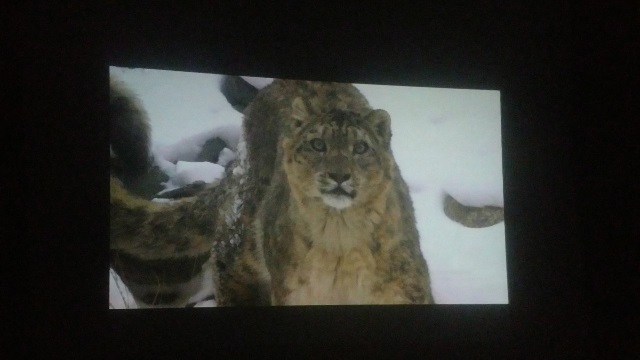
The snow leopard is an apex predator found in the mountain wilderness of the Himalayan and Central Asian region typically found at an elevation of 3,000-4,000 meters above sea level.
In Pakistan, the snow leopard is found only in the Hindu Kush and Karakoram region of Khyber Pakhtunkhwa, Gilgit-Baltistan, and Azad Kashmir with an estimated population of around 200-420 according to the Snow Leopard Trust.
Globally the snow leopard's conservation status is assessed as 'Vulnerable' with an estimated population of around 2,710-3,386 individuals as per the International Union for Conservation of Nature Redlist of Threatened Species (IUCN).
Snow leopards imperative part of ecosystem: experts
The documentary beautifully captures the hardships endured by director Khan and veteran conservationist Hussain Ali, who tracked the 2,000 sq km national park bordering the Pak-Chinese border to find and document the life of these majestic cats.
Himalayan ibex, the main prey species of the snow leopard were filmed rutting in the mating season, while visuals of the beautiful golden eagle flying above the mountain thermals were also featured in the documentary.
After months of tracking and searching for signs through paw marks, carcasses and scavengers such as the lammergeier (bearded vulture) and red fox, Khan managed to film a mother snow leopard. This is the first time a snow leopard camouflaged by her two cubs has been filmed in the habitat of Khunjerab National Park.
The documentary concluded with footage of a male snow leopard indulged in the hunt for a Himalayan ibex. Shooting this action was nothing less than a daunting task as these beasts keep on disappearing from their hunting areas.
Preserving ecosystem: Snow leopard day celebrated
In Pursuit of Phantom also highlights the major reason why snow leopards are an increasingly endangered species in the region. Goat and sheepherders routinely lose large number of their livestock to snow leopards, as the rare cats break into the livestock enclosures and kills their livestock. Due to the lack of any government compensation scheme, many villagers are forced to kill the snow leopards in retaliation.
Snow leopards around the world are endangered due to the ever-increasing threat of poaching, climate change, conflict with herders and development of new mining and infrastructure projects (roads, railroads, hydro-dams, etc).
Celesta von Chamier who had worked as an assistant editor for this documentary and had travelled from Islamabad for this screening said, “This documentary is 100 per cent made in Pakistan, created for the people of Pakistan by a Pakistani documentarian”
A hobbyist ornithologist and passionate conservationist from Germany, Celesta pointed out that the major threat the snow leopard faces in Pakistan is the issue of human-wildlife conflict.
"Wolves in Germany were hunted to extinction due to which there were no wolves in the country less than 20 years ago," further adding, "But now, wolves have made a comeback and there are around 400 wolves as the public perception changed towards saving these carnivores," she added.
Celesta urged the youth sitting in the audience to know more about the wildlife of their country in order to save them, "which is why the screening of the documentary was organised" she said.
Edit: The print version of this story wrongly stated "Celesta" as "Celeste" in the third last and the last paragraph, this error was corrected on the web.

1725612926-0/Tribune-Pic-(8)1725612926-0-165x106.webp)





1730355716-0/Copy-of-Untitled-(59)1730355716-0-270x192.webp)
1730276684-0/Copy-of-Untitled-(55)1730276684-0-270x192.webp)
1730095495-1/WhatsApp-Image-2024-10-28-at-11-04-18-(1)1730095495-1-270x192.webp)







COMMENTS
Comments are moderated and generally will be posted if they are on-topic and not abusive.
For more information, please see our Comments FAQ